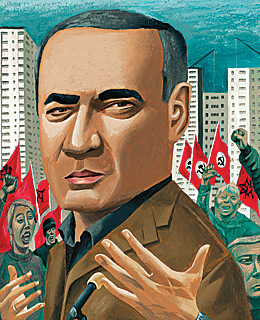
Garry Kasparov
Garry Kasparov likes to say he has been in politics all his life. In the Soviet Union, the nation in which he grew up, chess was a way of demonstrating the superiority of communism over the decadent West, and a chess prodigy was inevitably a political figure. Kasparov never dodged that fate; when he took on and eventually defeated Anatoly Karpov, the darling of the Soviet chess establishment, in 1985, his image as a prominent outsider—Kasparov is half Jewish, half Armenian—was fixed.
Kasparov's status has been maintained in post-Soviet Russia. His organization, the Other Russia, a coalition of those opposed to the rule of President Vladimir Putin, has held a series of demonstrations, often broken up by the police. For Kasparov, Russia today, dominated by a combination of huge energy enterprises and former security apparatchiks (such as Putin), is a betrayal of those who dreamed of democracy in the early 1990s.
Putin's foes are fragmented and run from old-fashioned nationalists to modern liberals; Kasparov, 44, insists he is just a moderator, not a leader, of the movement. But by giving a voice to those who believe that Russia can develop in a way different from the authoritarianism that seems always to have been its fate, the retired grand master shows that he has not yet made his last move.